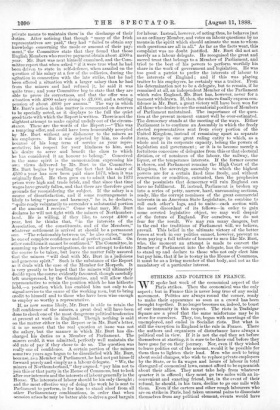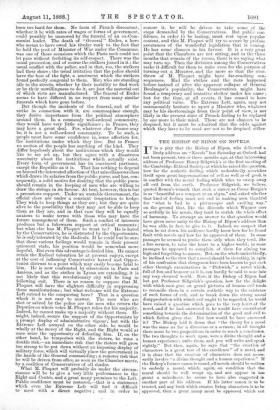STRIKES AND POLITICS IN FRANCE.
WE spoke last week of the economical aspect of the Paris strikes. Then the economical was the only aspect ; but in France this is never long true of any social movement. Politics are always round the corner, ready to make their appearance so soon as a crowd has been brought together. It no longer becomes us, indeed, to boast of our immunity in this respect. The riots in Trafalgar Square are a proof that the same misfortune may be in store for ourselves. They, too, began with meetings of the unemployed, and ended in Socialist riots. But what is still the exception in England is the rule in France. There the authors and organisers of disturbance have always a political end in view. If it is not the end they set before themselves at starting, it is sure to be their end before they have gone far on their journey. Nor, even if they wished to leave politics out of the account, would it be possible for them thus to lighten their load. Men who seek to bring about social changes, who wish to replace private employers by the State, or to fix wages and hours of labour in total disregard of economical laws, cannot afford to be squeamish about their allies. They must take help from whatever quarter it is offered ; they must go two miles with an in- convenient and exacting friend, lest, in the event of their refusal, he should, in his turn, decline to go one mile with them. Even if the carters and other rough labourers who are on strike in Paris, had taken unusual pains to dissociate themselves from any political element, events would have been too hard for them. No form of French discontent, whether it be with rates of wages or forms of government, could possibly be unmoved by the funeral of an ex-Com- munist leader. The death of " General" Eudes, a hero who seems to have owed his titular rank to the fact that he held the post of Minister of War under the Commune, was one of those occasions which the Paris mob could not let pass without forfeiting its self-respect. There was the usual procession, and of course the strikers joined in it; the usual conflict with the police, and in that, too, the strikers had their share; the usual irritation that the police should have the best of the fight, a sentiment which the strikers found perfectly congenial to them. Men who are standing idle in the streets, whether by their inability to find work or by their unwillingness to do it, are just the material out of which riots are manufactured. The funeral of Eudes seems to have differed in no respect from many similar funerals which have gone before.
But though the incidents of the funeral, and of the strike in connection with it, are commonplace enough, they derive importance from the political atmosphere around them. In a commonly well-ordered community, they would. have very little significance ; in France, they may have a great deal. For, whatever else France may be, it is not a well-ordered community. To be such, a people must have some confidence in, some affection for, the institutions under which they live. But in France no section of the people has anything of the kind. They differ hopelessly about the institutions which they would like to see set up, but they agree with a disastrous unanimity about the institutions which actually exist. Every form of government has its convinced partisans, except the Republic as it is. That has nothing to depend on beyond the interested affection of that miscellaneous class which draws its salaries from the public purse, and has, con- sequently, a solid motive for desiring that the public purse should remain in the keeping of men who are willing to draw the strings in its favour. At best, however, this is but a precarious support. Under an unstable Government, the official class are under a constant temptation to hedge. They wish to keep things as they are ; but they are quite alive to the possibility that they may not be able to keep them as they are, and in that case they will be equally anxious to make terms with those who may have the future management of them. Such a conflict of interests produces but a lukewarm support at critical moments ; but what else has M. Floquet to trust to ? He is hated by the Conservatives, he is distrusted by the Opportunists, he is only tolerated by the Radicals. If he could but be sure that these various feelings would remain in their present quiescent state, his position would be somewhat more hopeful. But even this advantage is denied him. He cannot retain the Radical toleration he at present enjoys, except at the cost of inflaming Conservative hatred and Oppor- tunist distrust to a point which may easily become fatal to him. He is now confronted by street-riots in Paris and Amiens, and as the strikes in Lyons are extending, it is not likely that this revolutionary city will be long in following suit. There is no reason to suppose that M. Floquet will have the slightest difficulty in suppressing these manifestations ; but what welcome will the Extreme Left extend to the conquering hero ? That is a question which it is not easy to answer. The men who are shot or sabred by the police are the men who return the Deputies on whose votes M. Floquet relies for his majority. Indeed, he cannot make up a majority without them. He might, indeed, secure the support of the Opportunists by a prompt display of administrative vigour; but with the Extreme Left arrayed on the other side, he would be wholly at the mercy of the Right, and the Right would at once seize the opportunity of defeating him. If, on the other hand, he temporises with the rioters, he runs a double risk,—an immediate risk that the rioters will grow too strong to be put down without an imposing display of military force, which will virtually place the government in the hands of the General commanding; a remoter risk that he will be driven from office, as soon as the Chamber meets, by a coalition of Conservatives of all shades.
What M. Floquet will probably do under the circum- stances will be to give a very little performance to the Right and Centre, and a great many promises to the Left. Public confidence must be restored,—that is a statement which even the Extreme Left will find it difficult to meet with a direct negative ; and in order to. restore it, he will be driven to take some of the steps demanded by the Conservatives. But public con- fidence, in order to be lasting, must rest upon popular content, and this M. Floquet will try to secure by profuse assurances of the wonderful legislation that is coming. He has some chances in his favour. It is a very great point that the Chambers are not sitting, and in the three months that remain of the recess, there is no saying what may turn up. Then the divisions among the Conservatives make it difficult for them to unite even for the purpose of turning out a Minister, and the more so • that the over- throw of M. Floquet might have far-reaching con- sequences. Had the strikes and the riots happened before instead of after the apparent collapse of General Boulanger's popularity, the Conservatives might have found a temporary and tentative shelter under his name ; but for the time, at all events, it has ceased to have any political value. The Extreme Left, again, may not unreasonably hesitate to upset a Minister who, whatever may be his shortcomings from their point of view, is not likely in the present state of French feeling to be replaced by one more to their mind. These are not chances to be despised, but it must be admitted that the odds against which they have to be used are not to be despised either_



































 Previous page
Previous page